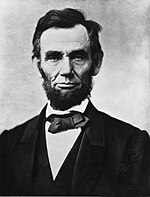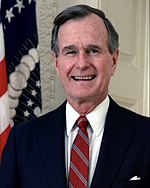Historical rankings of presidents of the United States
This article does not have any sources. (June 2019) |
Historians (and sometimes political scientists) are surveyed and asked to give presidents of the United States number ratings on their overall performance or on different aspects of their leadership.
Several different factors are considered in deciding what makes one a good or bad president. These include their character, their vision for the country, their relations with congress, their relations with foreign leaders (diplomacy), how they managed the economy, how they managed the military, and their overall political skill.
To make sure the rankings are fair, many surveys equally balance the opinions of Democrats and Republicans.
It is sometimes difficult to accurately rank a president because all of the presidents faced completely different challenges.
Historical opinions of U.S. presidents may change over time. For example, Harry S. Truman had very low approval ratings after he left office, but many historians now consider him among some the greatest presidents.
General findings
[change | change source]Highly ranked
[change | change source]
The following presidents are usually ranked highly:
- George Washington (the first president of the United States and helped the country win the American Revolutionary War)
- John Adams (oversaw the Quasi-War)
- Thomas Jefferson (partly because of the Louisiana Purchase and for being the author of the Declaration of Independence)
- James Madison (led the United States through the War of 1812)
- James Monroe (expanded the United States and supported the founding of colonies in Africa for free African Americans)
- James K. Polk (President during the Mexican American War)
- Abraham Lincoln (led the United States through the American Civil War and helped end slavery)
- Theodore Roosevelt (strengthened the United States Military and had the Panama Canal built)
- Woodrow Wilson (President during World War I, supporting women's rights, and created the Federal Reserve)
- Franklin D. Roosevelt (led the country out of the Great Depression by restoring the economy, ended alcohol prohibition, and President during World War II)
- Harry S. Truman (President during the end of World War II, the beginning of the Cold War and the integration of the Armed Forces)
- Dwight Eisenhower (President during the Cold War, created NASA, and reformed the United States highway system)
- John F. Kennedy (led the United States through the Cuban Missile Crisis and the Cold War)
- Ronald Reagan (helped restore the American economy by lowering inflation and creating jobs, created better relations with Soviet Russia, helped end the creation of new nuclear weapons, and led the United States through the end of the Cold War)
- Barack Obama (improved the economy, improved auto manufacturing, and made a more accessible form of healthcare known as Obamacare)
Mixed ratings
[change | change source]
Some presidents have mixed ratings. For example, Andrew Jackson stood for the common man, but was criticized for implementing the Trail of Tears. Ulysses S. Grant is thought to be a bad leader since he had corruption surrounding him, but he helped African-Americans to have more rights in the Reconstruction Era.
Examples of presidents with mixed opinions include:
- Calvin Coolidge (helped the economy and civil rights, but supported alcohol prohibition)
- Lyndon B. Johnson (passed civil rights bills and President during the Great Society, but also worsened the Vietnam War)
- Jimmy Carter (helped pardon Vietnam War draft evaders, created the Education and Energy departments and negotiated a peace treaty between Egypt and Israel, but weakened the American economy through high unemployment and high inflation, and oversaw the Iran hostage crisis, the 1979 oil crisis and the failed Operation Eagle Claw.)
- George H. W. Bush (successfully led the United States through the Persian Gulf War and for formally ending the Cold War, but the American economy struggled a bit while he was in office)
- Bill Clinton (improved the United States economy in the long term, but was impeached after being caught in the Monica Lewinsky scandal)
Low in rankings
[change | change source]
- John Tyler, Zachary Taylor, Millard Fillmore, Chester Arthur, William Howard Taft, Benjamin Harrison, Herbert Hoover, Rutherford B. Hayes, Martin Van Buren, Richard Nixon, and George W. Bush are below average.
- Franklin Pierce and James Buchanan (both refused to prevent the growth of the slavery, which caused the Civil War)
- Andrew Johnson (against Lincoln's Reconstruction)
- Warren G. Harding (hired corrupt people to become government officials)
- Donald Trump (imposed travel bans on several Muslim countries and was impeached twice by Congress for the Trump-Ukraine scandal in 2020 and for inciting the January 6 riot at the United States Capitol in 2021)
Not ranked
[change | change source]- William Henry Harrison (died shortly after becoming president)
- James Garfield (was assassinated shortly after becoming president)
- Joe Biden (not yet ranked in polls because he is currently in office)
Other websites
[change | change source]- C-SPAN Archived 2009-02-17 at the Wayback Machine
- Opinion Journal
- Times of London[permanent dead link]
